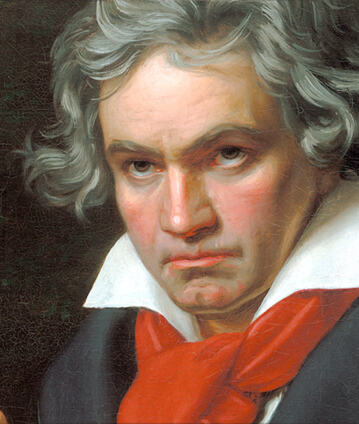Ludwig van Beethoven
Composer
“I will seize fate by the throat; it will never bend me completely to its will,” wrote Ludwig van Beethoven during a major life crisis. And in fact, no other music so strongly expresses the powers that threaten mankind as Beethoven’s works; at the same time, they mobilise the resilience of the individual. It is from this tension that the art of the last of the First Viennese School derives its unmistakable radicalism to this day.
Beethoven, a contemporary of the French Revolution and its consequences, went down in history not least as the creator of humanism in musical form. Beethoven, who was born in Bonn but made Vienna his home, created musical milestones with his only opera, Fidelio, and his Missa Solemnis, but the focus of his work is in the genres of the symphony, the solo concerto, the string quartet and the piano sonata. He took up the traditional forms of his predecessors Haydn and Mozart, perfected them, and with his late work, in which Bach’s polyphonic music also finds echoes, he looks ahead far into the future. Beethoven has always been part of the core repertoire of the Berliner Philharmoniker. Performances by Hans von Bülow and Wilhelm Furtwängler are legendary. Herbert von Karajan, Fürtwängler’s successor as chief conductor of the orchestra, played all of Beethoven’s symphonies several times, as did Claudio Abbado and Sir Simon Rattle. Both of the latter presented internationally acclaimed cycles at the end of their tenures. The interpretations of all three conductors are fortunately documented in their entirety in sound and video recordings. Chief conductor Kirill Petrenko is now also exploring Beethoven’s symphonies with the Berliner Philharmoniker. When he took up his post, he delighted audiences in the Philharmonie Berlin and in front of the Brandenburg Gate with his dynamic performance of the Ninth, including the exuberant “Ode to Joy”.